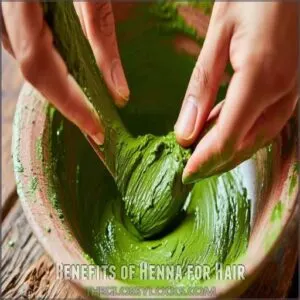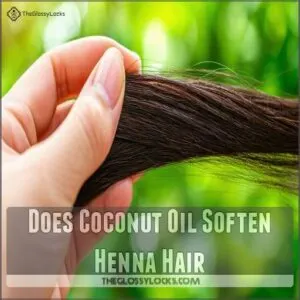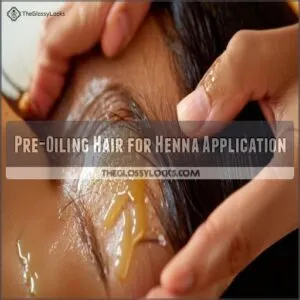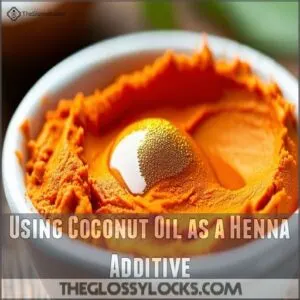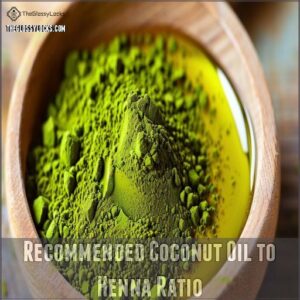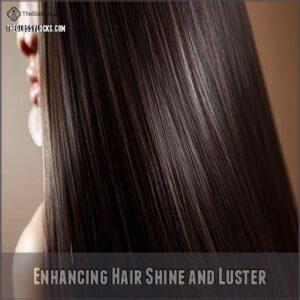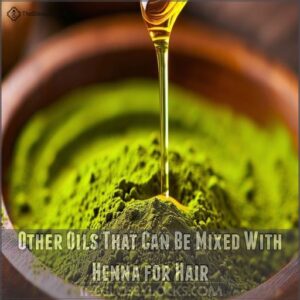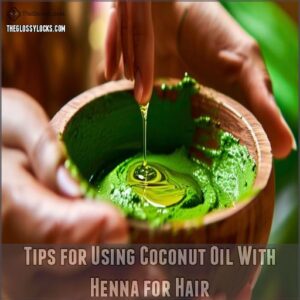This site is supported by our readers. We may earn a commission, at no cost to you, if you purchase through links.

When you mix coconut oil into your henna paste, it adds extra moisture, making your hair feel smoother and more manageable.
Think of it as giving your hair a tropical vacation without leaving home.
Coconut oil helps reduce dryness and also enhances the rich red tones henna provides.
It’s like hitting two birds with one stone—conditioned and colored hair!
So, next time you prepare your henna mixture, toss in some coconut oil and watch your locks transform.
Keep reading for more hair treat secrets!
Table Of Contents
- Key Takeaways
- Benefits of Henna for Hair
- Does Coconut Oil Soften Henna Hair
- How to Mix Coconut Oil With Henna for Hair
- Henna and Coconut Oil Hair Mask Benefits
- Other Oils That Can Be Mixed With Henna for Hair
- Tips for Using Coconut Oil With Henna for Hair
- Frequently Asked Questions (FAQs)
- How to use henna oil & coconut oil?
- Is coconut oil good for hair and skin?
- Does henna soften hair?
- Can you use coconut oil to darken henna?
- Is henna oil good for hair?
- How henna & coconut milk make a good hair mask?
- Can I mix coconut oil with henna for hair?
- How do you soften henna hair?
- Will coconut oil fade henna?
- Will coconut oil soften my hair?
- Can coconut oil lighten henna color?
- Does coconut oil affect hennas staining power?
- Will coconut oil prevent henna dryness?
- How much coconut oil should I use?
- Can I use other oils with coconut oil and henna?
- Conclusion
Key Takeaways
- Mixing coconut oil with henna not only softens your hair but also reduces dryness, making it more manageable and less prone to brittleness.
- Coconut oil enhances henna’s natural color effects while adding moisture, preventing the hair from feeling dry and ensuring a smoother application.
- Pre-oiling your hair with coconut oil before applying henna creates a protective barrier against dryness, leading to better overall hair health.
- Experimenting with coconut oil and henna offers dual benefits: vibrant, natural color plus conditioned, nourished locks.
Benefits of Henna for Hair
If you’re exploring ways to enhance your hair’s natural beauty, henna offers a chemical-free coloring option that boasts an array of benefits.
It conditions and strengthens your hair, but it also helps balance scalp pH—which, let’s face it, might just put those pricey salon treatments to shame.
Natural Hair Dye Properties
Henna is your go-to for bold, orange-reddish hues, offering a safe alternative to chemical dyes.
Unlike those boxed surprises, henna is predictable—no harsh surprises here!
It’s perfect for DIY henna recipes and even covering gray strands.
Plus, you’ll avoid the damage typical of chemical counterparts.
Embrace henna for vibrant, natural color.
Henna’s Medicinal and Cosmetic Uses
Henna isn’t just a color powerhouse; it’s got a whole arsenal of benefits for skin, nails, and hair.
Beyond vibrant hair color, it:
- Balances scalp pH, keeping your head in harmony.
- According to studies on hair growth rates, a well-nourished scalp is essential for healthy hair, encourages hair growth and tackles hair loss.
- Heals skin annoyances with its soothing touch.
- Strengthens nails naturally, adding a glossy finish.
Embrace nature’s multi-tasker!
Conditioning and Strengthening Hair
Ever wondered about henna’s magic on your hair?
Beyond its natural color, henna deeply conditions, strengthening each strand from root to tip.
Think of it as a natural protein treatment!
Many hair mask recipes include henna for its strengthening power.
You’ll notice improved manageability and a healthy shine.
For extra oomph, try some hair oil blends with henna.
It’s a simple addition to your hair care routine that yields impressive results, boosting hair growth and overall health.
Balancing Scalp PH
Think of your scalp as a well-tuned instrument.
Keeping pH levels balanced is key for harmony in scalp health, guarding against hair loss and dandruff.
By incorporating a henna hair treatment product from a reliable source, like henna hair treatment products, you can give your hair the best chance at healthy growth.
Henna naturally restores this balance, promoting healthy hair growth.
Imagine avoiding those frustrating hair woes with nature’s touch—no wonder henna’s a favorite.
Your hair sings a healthier tune when your scalp’s in sync!
Does Coconut Oil Soften Henna Hair
When you mix coconut oil with henna, you might just find that your hair feels softer and more manageable.
Coconut oil‘s moisturizing properties help reduce the dryness and dripping often associated with henna, leaving your strands smoother and more nourished.
The Effect of Coconut Oil on Henna
Coconut oil and henna have a unique chemistry.
When mixed, coconut oil can:
- Enhance henna’s texture, making it smoother for application.
- Balance the intensity of henna color, ensuring vibrant but less drastic tones.
- Add moisture without over-saturating to prevent dripping.
This combo offers control over dye strength and application, giving your hair a softer touch without compromise.
Coconut Oil’s Moisturizing Properties
For moisturizing, coconut oil’s got your back. It tackles dryness with its rich fatty acids, leaving your hair softer. Products like those found on Coconut Oil Soften Henna websites often showcase coconut oil’s benefits. Unlike some oils, coconut oil penetrates deeply into the hair shaft, making it a go-to for nourishment.
| Coconut Oil Benefits | Details |
|---|---|
| Deep Moisture | Penetrates hair shaft |
| Nourishing Power | Rich in fatty acids |
| Multi-use for Scalp | Soothes and hydrates |
| DIY Treatments | Easy to use at home |
Reducing Dryness and Dripping
Nobody wants drippy, dry hair after a henna session.
Coconut oil’s like a superhero in this situation, stepping in with some well-timed help.
Adding coconut oil to henna can help combat dryness and brittleness, which are common signs of dry and damaged hair.
Follow these steps:
- Pre-oil hair to combat henna’s drying effects.
- Add a dash of oil when mixing henna for consistency.
- Apply post-henna for extra moisture.
- Experience less dripping and softer hair.
How to Mix Coconut Oil With Henna for Hair
Ready to get your henna on?
We’ll show you how to easily incorporate coconut oil into your henna mix for softer, shinier hair.
We’ll cover everything from pre-treatment oiling to post-henna conditioning.
Pre-Oiling Hair for Henna Application
Softening hair with henna is a breeze if you pre-oil with coconut oil.
Picture having a sturdy umbrella in a rainstorm—that’s what coconut oil does for your strands.
Pre-oiling before henna can save your scalp from dryness and help you achieve even color.
Here’s a quick guide:
| Benefits | Coconut Oil Types | Techniques | Timing |
|---|---|---|---|
| Prevents Dryness | Extra Virgin | Massage Gently | Night Before |
| Even Coloring | Refined | Section Wisely | 1 Hour Prior |
Feel free to explore these techniques for happy hair!
Using Coconut Oil as a Henna Additive
Mixing coconut oil with henna can turn a regular pasty ordeal into a smooth DIY hair mask adventure. Here’s how:
- Ratio Matters: Use one tablespoon of coconut oil per four tablespoons of henna powder.
- Mix It Right: Blend with warm water until it’s creamy.
- Mind the Wait: Let the mixture sit for color release.
Applying Coconut Oil After Henna Treatment
After rinsing out your henna treatment, applying coconut oil can work wonders in keeping your hair soft and manageable.
You can find a variety of coconut oil henna products online, such as at coconut oil henna shops, to help you achieve the best results.
Coconut oil’s benefits don’t just stop at shine and moisture; it acts like a shield, protecting against dryness.
Use a small amount to avoid greasiness, and think of it as your hair’s soothing balm after a color marathon.
Recommended Coconut Oil to Henna Ratio
When you’re looking to soften your henna-treated hair, consider mixing coconut oil with your henna paste.
Coconut oil can improve scalp health by reducing inflammation and combating bacteria, effectively treating dandruff and promoting a healthy scalp environment through its anti-inflammatory properties.
Aim for a balance by adding:
- 1-2 tablespoons of coconut oil per 100 grams of henna powder.
- Adjust based on hair length and texture impact.
- Mix thoroughly for consistent application time.
This ratio delivers improved henna paste consistency without excessive greasiness.
Henna and Coconut Oil Hair Mask Benefits
Combining henna with coconut oil can transform your hair care routine, providing both nourishment and shine that your hair craves.
It’s like giving your locks a spa day—softening, strengthening, and safeguarding them from damage and breakage.
Without leaving your wallet empty or your hair dry.
Nourishing and Conditioning Hair
Enhance your hair care routine with a castor oil hair mask for silky, frizz-free locks. Pamper your locks with a henna and coconut oil hair mask for ultimate nourishment and conditioning.
It’s like a spa day for your hair, using natural hair care secrets to leave strands feeling soft and manageable.
With henna hair treatments, you’ll find a balance between tradition and modern care, creating DIY hair products that nurture your hair health with ease.
Enhancing Hair Shine and Luster
Nourishing your hair with a henna and coconut oil mask does wonders beyond just softness. You’ll notice a boost in shine, too! Think of it as a natural hair gloss. Here’s what you can expect:
- A noticeable increase in luster.
- Improved manageability.
- Deeper, richer color (if using henna).
- Reduced frizz and flyaways.
This simple combo gives you gorgeous, healthy-looking hair. It’s a win-win!
Promoting Hair Growth and Strength
Imagine your hair beaming like the sun, strong and full of life.
That’s the power of combining coconut oil with henna.
This duo tackles hair loss, promoting growth by nourishing your scalp with essential nutrients.
Embrace these healthy hair tips, and explore the wonders of improving scalp health.
Enjoy thriving hair as you effectively boost strength and resilience.
Protecting Against Damage and Breakage
When you’re looking for the secret sauce to protect against hair damage and breakage, adding coconut oil to henna is your ace in the hole.
This blend targets:
- Split ends solution
- Breakage prevention
- Henna for damaged hair
- Vitamin B5 plays a crucial role in maintaining scalp health and preventing dryness. Healthy hair growth
Think of it as the ultimate hair superhero, swooping in with protein treatments to keep your locks strong and healthy.
Other Oils That Can Be Mixed With Henna for Hair
If you’re looking to amp up your henna treatment, coconut oil isn’t your only option—consider adding amla, olive, argan, or jojoba oil for an extra boost.
These oils don’t just nourish; they bring unique benefits like enhanced shine, moisturization, and scalp balance, making your hair care routine a bit more exciting and effective.
Amla Oil for Hair Growth and Shine
You know that amla oil‘s your best friend for hair growth and shine.
With its rich blend of nutrients, it strengthens and nourishes right from the roots.
Using amla oil with henna can boost your hair’s health, tackle hair loss, and give it a glossy finish. Regular scalp massages with ghee, known for its benefits of ghee for hair, can also improve blood circulation to the follicles, preventing hair loss, and when combined with henna, can lead to a healthier scalp and stronger locks.
Think of amla as the secret ingredient for luscious locks without the fuss!
Olive Oil for Moisturizing and Conditioning
Shift from your trusty amla oil to the richness of olive oil for moisturizing and conditioning your hair.
Olive oil hair masks can be your go-to, boasting benefits that coconut oil might envy.
Use olive oil for dry hair: it penetrates deeply to nourish and soften, giving your hair a healthier, more manageable feel without the greasy aftermath.
Argan Oil for Hydration and Protection
Argan oil is often hailed as liquid gold for good reason.
It deeply hydrates and protects your hair from everyday wear and tear, a bit like a shield against the mundane battle of bad hair days.
Combining argan oil with henna boosts softness and shine and also offers that extra layer of protection your hair craves.
Jojoba Oil for Balancing Scalp PH
Speaking of oils, let’s talk jojoba. Unlike argan oil’s focus on hydration, jojoba oil’s main benefit is balancing your scalp’s pH.
This is important because a balanced pH helps prevent dandruff and keeps your scalp happy.
Think of it as your scalp’s own personal peace treaty!
Adding jojoba to your henna mix can be a great way to get the benefits of both.
Jojoba oil for hair is a natural choice.
Tips for Using Coconut Oil With Henna for Hair
When you’re adding coconut oil to your henna routine, choosing the right type is key to getting that smooth, silky finish.
Avoid overdoing it with the oil, or you’ll end up with hair that’s heavier than a wet blanket!
Choosing The Right Coconut Oil for Hair
Coconut oil’s like a secret weapon for softening henna-treated hair.
Choose the right type to maximize benefits:
- Organic Coconut Oil offers natural goodness.
- Refined vs Unrefined: Unrefined retains more nutrients.
- Virgin Coconut Oil boasts purity and richness.
- Cold-Pressed Coconut Oil preserves important compounds.
- Avoid additives to keep it pure.
Pick wisely for the best results!
Avoiding Excessive Coconut Oil Use
You’ve picked the right coconut oil, but beware of overdoing it.
Too much oil can weigh down your hair and lead to unwanted greasiness, potentially causing coconut oil side effects.
Additionally, hair oil can also cause dirt buildup in strands, leaving them weighed down and dull, as seen in common oil downsides.
Balance is key to avoiding coconut oil hair damage.
When applying henna with coconut oil, consider leaving henna overnight for deeper color intensity and to achieve the desired results. A little goes a long way in locking in moisture while keeping your henna treatment effective and vibrant.
Mixing Coconut Oil With Other Henna Additives
While avoiding too much coconut oil is key, mixing it with other henna additives can create the ultimate DIY henna recipe.
Try blending with amla for a boost in growth or olive oil for extra moisture.
Experiment with different additive ratios to find the best oil combos.
You’ll soon master mixing techniques that transform your hair’s texture and shine.
Storing Coconut Oil and Henna Mixtures
Stash your henna-coconut oil mix in airtight containers to keep it fresh and lively.
Fridge storage extends the mixture’s shelf life while preventing spoilage.
You don’t want your fresh concoction wilting before it works its magic!
Remember, using a storage container with a good seal is key to maintaining its potency and ensuring it delivers the hair-softening results you crave.
Frequently Asked Questions (FAQs)
How to use henna oil & coconut oil?
Mix henna oil and coconut oil to create a powerful hair treatment.
Henna strengthens and supports growth, while coconut oil adds softness and shine.
Apply generously, let it sit, and rinse for healthy, vibrant hair.
Is coconut oil good for hair and skin?
Coconut oil is fantastic for hair and skin, providing deep moisture and nourishment.
It can help soften hair and make skin glow, acting like nature’s miracle worker.
Embrace its tropical magic for smoother locks and hydrated skin!
Does henna soften hair?
Henna doesn’t actually soften hair; it can leave it feeling a bit dry.
Combining henna with moisturizing agents like coconut oil can enhance its conditioning effects, helping your hair feel softer and more manageable.
Can you use coconut oil to darken henna?
You might think coconut oil can darken henna, but it won’t.
Instead, it enhances shine and moisture.
If you’re aiming for darker color, stick with henna plus indigo.
Coconut oil keeps your hair soft and hydrated.
Is henna oil good for hair?
Using henna oil can be a game-changer for your locks, as it regulates sebum production, fights dandruff, and adds shine.
Coconut oil is a key ingredient in many natural hair growth remedies for damaged hair, including a hair mask or conditioner, natural hair growth remedies. It is an excellent natural remedy for promoting healthy hair growth and scalp balance.
How henna & coconut milk make a good hair mask?
Coconut milk’s creamy goodness softens while henna adds color and shine. Mix them for a deeply conditioning, vibrant hair mask! It’s a win-win for gorgeous, healthy hair.
Can I mix coconut oil with henna for hair?
Did you know 30% of people opt for natural hair treatments?
Mixing coconut oil with henna softens your hair but also adds shine and moisture, making your hair look vibrant and feel silky smooth.
How do you soften henna hair?
To soften hair after using henna, mix in a splash of coconut oil or a dollop of your favorite conditioner into your henna paste.
Post-henna, treat your locks to a nourishing oil massage for extra softness.
Will coconut oil fade henna?
You’ve got a magical potion with henna and coconut oil, and no, coconut oil won’t fade henna.
Instead, it adds moisture, making your hair feel silkier while maintaining the vibrant hues henna naturally imparts on your locks.
Will coconut oil soften my hair?
Using coconut oil can indeed make your hair softer.
It’s like giving your hair a spa day, adding moisture and shine while taming frizz.
Just massage it in before washing for the best results.
Can coconut oil lighten henna color?
Think of coconut oil as a gentle whisper to your henna-colored hair—a soothing presence.
It moisturizes and adds shine.
It doesn’t lighten henna’s hue.
Your vibrant, rich tones will stay intact.
Does coconut oil affect hennas staining power?
Coconut oil doesn’t compromise henna’s staining power.
Instead, it can help maintain moisture during the process.
While the vibrant color remains intact, you’ll get added softness and shine, making your hair look healthier post-application.
Will coconut oil prevent henna dryness?
Pre-oiling with coconut oil helps!
It creates a barrier, preventing henna from drying out your hair.
This keeps your strands happy and hydrated during the coloring process.
Enjoy softer, more moisturized hair.
How much coconut oil should I use?
While preparing henna, add about one to two tablespoons of coconut oil.
This amount strikes a balance, ensuring your hair benefits from the moisture without becoming overly greasy or affecting the dye’s effectiveness.
Can I use other oils with coconut oil and henna?
Absolutely, you can blend coconut oil with other oils like olive or almond oil in your henna mix.
This combo boosts moisture, making your hair softer and shinier while the henna works its color magic.
Conclusion
Imagine your hair as a thirsty traveler finding relief in an oasis; that’s exactly what adding coconut oil to henna does for your hair.
This tropical treasure not only softens your strands but also amplifies those vibrant henna hues.
By making your hair more manageable and less dry, coconut oil transforms your hair treatment experience.
So, when you ask, "Will adding coconut oil to henna make hair softer?"—the answer is a resounding yes, bringing nourishing benefits.

